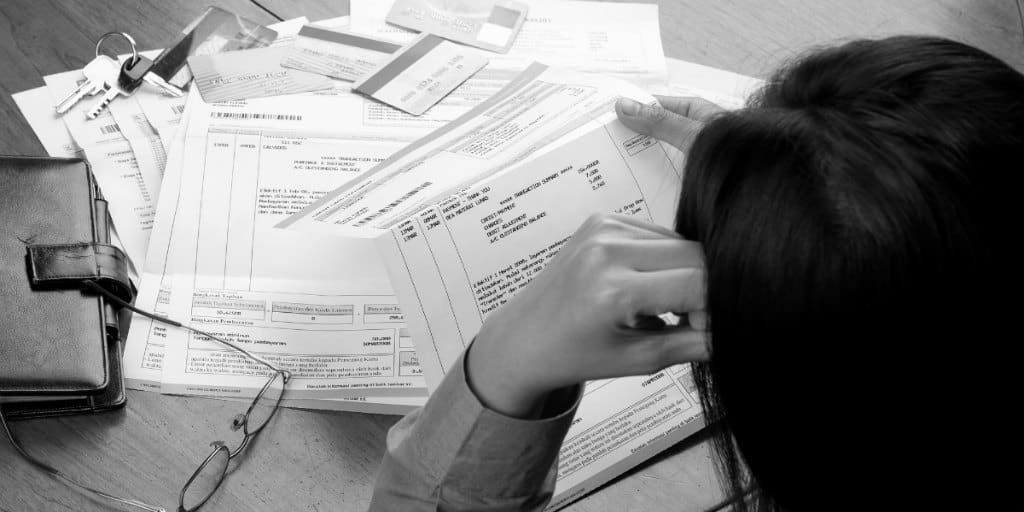Pay Off Credit Card Debt for Good [and faster]
(This page may contain affiliate links and we may earn fees from qualifying purchases at no additional cost to you. See our Disclosure for more info.)
After you pay your mortgage or rent, buy groceries, and send in the car payment, there may not be enough money left for the month.
It’s easy to use a credit card to fill in the shortage. But before you know it, you’ve run up massive balances, with no idea how you’re going to pay off your credit cards.
According to Experian, the average credit card balance is just below $6,200, and Americans, on average, carry four credit cards.
Whether you’re below or above the average, this article will give you the basics for paying it off faster and getting rid of it forever.

1. Know Your Total Credit Card Debt
First of all, you need to face the total amount of credit card debt you have.
Gather up all your credit cards. Log on to every card’s site or grab all of your credit card statements for the last month.
If you can’t log in or find your statements, call the account number on each card and write down your current total balance.
Add up all of your total balances as of today. This is your total debt, and it’s what you’ll need to pay off.
Then make a list of your balances on each card from least to highest. This is the order you’re going to pay off your balances.
We've created a free spreadsheet for you to easily track your credit cards and payments too, download here.
With this sheet, you can quickly see how making additional payments over the minimum amount due will save you money on interest and eliminate your debt faster.
You might also want to draw yourself a thermometer or download ours and write in the amount of your total debt. Tape this thermometer where you’ll see it every day–on your fridge or your bathroom mirror.
Creating visuals can be an essential step because to pay off this debt – you need to have a daily reminder it’s there. It will also get you subconsciously thinking about how to find money to pay off more of the debt.
Read: How to Get Your Credit Score for Free
2. Request Lower Interest Rates
One of the fastest ways to see big savings on your credit card bills is to negotiate lower interest rates.
If you can reduce a percentage point or two off your card interest rates, you can save yourself several hundred depending on your balances as you pay off your debt.
A polite phone call request may be one of the best steps you take.
While your credit score and payment history will affect whether or not you're successful in getting a rate cut, other factors are considered – how long you've been a cardholder, your balance in comparison to your credit limit, etc.
All lenders approach this differently so it never hurts to ask!
Read: How Can a Bad Credit Score Hurt You?
3. Stop Creating More Debt
Here’s the tough part: if you want to pay off your credit cards, once and for all, you’re going to have to stop using them.
If you use credit cards to get you through the month, this is going to be hard, because at first – you may not have quite enough money to get you through your paycheck cycle.
Pull out your debit card and commit to using it, and only it, from here on out.
The rest of your credit cards can be cut up. Yes, that’s right–cut them up with a pair of scissors and throw the pieces in the trash.
If that feels too permanent, grab a bowl of water, drop your cards in, and stick it in the freezer. You can literally freeze your credit cards so they’ll only be available for an actual emergency.
Read: Why Is Taking on Debt (Even “Good” Debt) Such A Problem?
4. Save Up a Buffer
To stop using your credit cards for emergencies, you need to have an emergency fund.
It's recommended you save up $1000 if you don’t currently have any savings available. This will be your emergency fund while you’re paying off your cards.
How do you get $1000?
The easiest way is to sell unwanted items on eBay, Facebook Marketplace, or in a yard sale. Or pay the minimums on your cards until you can save the money from your paychecks.
$1000 can help you deal with most emergencies during the time you’re committed to paying off your debt. But if you don’t have that cash savings, you’ll have to put the emergency on your credit card, which you don’t want to do.
Read: Make Saving as Much Fun as Spending
5. Spend Only What You Have
You’ve got to figure out how much money you actually have to pay your monthly bills, along with your credit card debt.
First, figure out the monthly minimums on each of your cards. (Download our spreadsheet for this!) Now add those up.
This is the total amount of money you need to set aside to make sure you can pay each card for the month. (Don’t worry about them just being minimums – you’ll add to this amount later).
Next, add up the total expenses you have each month. Think about groceries, restaurants, utilities, clothing, mortgage or rent, car payments, tuition, insurance costs, and gifts.
It might help you to look through your credit card statements and see what you’ve spent money on over the last few months.
Add up your total expenses and your monthly credit card minimums.
If this amount is higher than your monthly paychecks (and it probably will be), then you need to start slashing. Eating out is an excellent place to begin.
- Instead of eating out every day at work, could you start bringing in a sandwich?
- For clothing, could you wear what you have and not purchase anything new for a few months?
- Could you carpool to work to cut your gas expenses?
- Could you sell your car and buy a cheaper one?
If the difference between your expenses and your earnings is huge, then you may need to think about making more money.
What can you sell?
Can you ask for a raise?
Or what side gig can you take on to make up the difference between what you spend and what you make?
It may be easier to slash expenses than it is to earn more income, so consider starting there.
Read: How Do I Budget When My Partner Is A Spender?
6. Use Every Extra Cent on Your Credit Card Debt
Once you get your expenses down, use every spare cent to pay down your debt.
You won’t ever have extra money if you wait to pay your debt at the end of your pay cycle. So right after you pay your rent or mortgage, pay your credit cards.
Commit to sending in as much extra money as you can to the card with the lowest balance.
For example, if you owe $1,213.71 on your Lowe’s card, then send in your $50 monthly minimum payment plus an extra amount of $150 (or whatever extra you’ve decided you can pay) to that card.
Now, color in your thermometer with the amount you’ve just paid off, even if it’s a tiny sliver.
When you can stay focused, you’ll make progress and get the balance paid off on that card.
Then, you’ll have that minimum payment ($50) plus your extra payment ($150) to apply to the next credit card you’ll pay off!
This is called the “Debt Snowball” method, and it’s hugely motivating because you can see results fast.
Read: Side Hustles to Pay Off Debt Quicker
Other Options People Consider for Eliminating Credit Card Debt
- Debt Avalanche Method – Instead of ordering the pay off of your credit cards by their dollar balance you order it by interest rate. You'll pay off the credit card with the highest interest rate first, followed by the next highest, etc.
- This method may save you more money in interest payments in the long run (or not) but it may not be as motivating as seeing the smaller balance cards getting wiped out faster.
- Balance Transfer Offers – With a 0% (or low rate) balance transfer offer you may save money in interest. But don't forget there is usually a transfer fee and if you don't pay off the balance before the low-interest rate expires it could end up costing you more.
- Personal Loan/Home Equity Loan – Consolidating all your credit card balances into one “debt consolidation” loan might seem like a good idea since you'll likely obtain a lower interest rate, but it does come with risks.
- Carefully consider these options because failure to repay a home equity loan can result in foreclosure on your house and defaulting on a personal loan will result in debt collection.
- 401(k) Loan – Borrowing from your retirement savings is generally not a good idea. Defaulting on a 401(k) loan could result in penalties and increased taxes, in addition to robbing yourself of future earnings and income in retirement.
Pay Off Credit Card Debt For Good
Know Your Total – Reduce Interest Rates – Stop Digging – Save Up a Buffer – Spend What You Have – Use Every Extra Cent on Your Debt
At first, your credit card balance will seem huge and impossible to pay off.
Over time, you’ll notice all your extra payments working to pay down your total balance.
It may take a long time–maybe even years–but once you pay off that debt, it will be gone forever.
If you commit to never running up a balance again, you can enjoy freedom from credit card debt for the rest of your life.
Next: Paying Off Debt? Be Wary of this Advice

Article written by Laurie
Laurie is a team member of Women Who Money and the founder of The Three Year Experiment, a blog about building wealth in order to become location independent.
